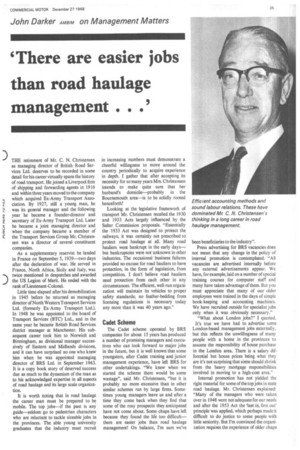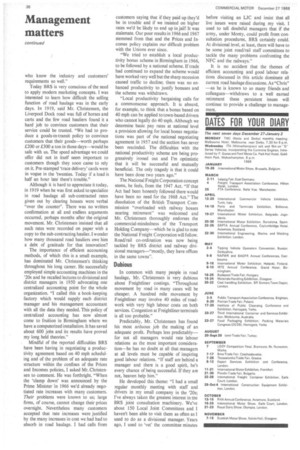'There are easier jobs than road haulage management . .
Page 37

Page 38

If you've noticed an error in this article please click here to report it so we can fix it.
THE retirement of Mr. C. N. Christensen as managing director of British Road Services Ltd. deserves to be recorded in some detail for his career virtually spans the history of road transport. He joined a Liverpool firm of shipping and forwarding agents in 1916 and within three years moved to the company which acquired Ex-Army Transport Association. By 1927, still a young man, he was its general manager and the following year he became a founder-director and secretary of Ex-Army Transport Ltd. Later he became a joint managing director and when the company became a member of the Transport Services Group Mr. Christensen was a director of several constituent companies.
As a supplementary reservist he landed in France on September 5, 1939—two days after the declaration of war. He served in France, North Africa, Sicily and Italy, was twice mentioned in despatches and awarded the US Legion of Merit. He ended with the rank of Lieutenant-Colonel.
Little time elapsed after his demobilization in 1945 before he returned as managing director of North Western Transport Services Ltd. (formerly Ex-Army Transport Ltd.). In 1948 he was appointed to the board of Transport Services (BTC) Ltd., and in the same year he became British Road Services district manager at Manchester. His subsequent career took him to Norwich and Birmingham, as divisional manager successively of Eastern and Midlands divisions, and it can have surprised no one who knew him when he was appointed managing director of BRS Ltd. in September 1963. It is a copy book story of deserved success due as much to the dynamism of the man as to his acknowledged expertise in all aspects of road haulage and its large scale organization.
It is worth noting that in road haulage the career man must be prepared to be mobile. The top jobs-----if the past is any guide—seldom go to pedestrian characters who are reluctant to tackle sizeable jobs in the provinces. The able young university graduates that the industry must recruit
in increasing numbers must demonstrate a cheerful willingness to move around the country periodically to acquire experience in depth. I gather that after accepting its necessity for so many years Mrs. Christensen intends to make quite sure that her husband's domicile—probably in the Bournemouth area—is to be solidly rooted henceforth!
Looking at the legislative framework of transport Mr. Christensen recalled the 1930 and 1933 Acts largely influenced by the Salter Commission proposals. "Essentially the 1933 Act was designed to protect the railways; it was certainly not prescribed to protect road haulage at all. Many road hauliers went bankrupt in the early days— but bankruptcies were not unknown in other industries. The occasional business failures provided no excuse for road hauliers to have protection, in the form of legislation, from competition. I don't believe road hauliers need protection from each other in any circumstances. The efficient, well-run organization will maintain its vehicles to proper safety standards; no feather-bedding from licensing regulations is necessary today any more than it was 40 years ago."
Cadet Scheme
The Cadet scheme operated by BRS companies for about 15 years has produced a number of promising managers and executives who can look forward to major jobs in the future, but it is well known that some youngsters, after Cadet training and junior management experience, have left BRS for other undertakings. "We knew when we started the scheme there would be some wastage", said Mr. Christensen, "but it is probably no more excessive than in other similar schemes run by large firms. Sometimes young managers leave us and after a time they come back when they find that some of the rosy prospects they anticipated have not come about. Some chaps have left because they found the life too difficult— there are easier jobs than road haulage management! On balance, I'm sure we've been beneficiaries to the industry".
Press advertising for BRS vacancies does not mean that any change in the policy of internal promotion is contemplated. "All vacancies are advertised internally before any external advertisements appear. We have, for example, laid on a number of special training courses for computer staff and many have taken advantage of them But you must appreciate that many of our older employees were trained in the days of simple book-keeping and accounting machines. We have recruited outside for specialist jobs only when it was obviously necessary."
"What about London jobs?" I queried.
It's true we have had to advertise some London-based management jobs externally, but this reflects the unwillingness of many people with a home in the provinces to assume the responsibility of house purchase in the London area. There is a salary differential but house prices being what they are it's not surprising that sbnie should shrink from the heavy mortgage responsibilities involved in moving to a high-cost area,
Internal promotion has not yielded the right material for some of the top jobs in state road haulage. Mr. Christensen explained: "Many of the managers who were taken over in 1948 were not adequate for our needs and after the 1953 Act the 'last in, first out' principle was applied, which perhaps made it difficult to do justice to some people with little seniority. But I'm convinced the organization requires the experience of older chaps who know the industry and customers' requirements so well."
Today BRS is very conscious of the need to apply modern marketing concepts. I was interested to learn how difficult the selling function of road haulage was in the early days. In 1919, said Mr. Christensen, the Liverpool Dock road was full of horses and carts and the few road hauliers found it a hard job to convince customers that their service could be trusted. "We had to produce a goods-in-transit policy to convince customers that their goods—worth perhaps £200 or £300 a ton in those days—would be safe with us. The speed advantage we could offer did not in itself seem important to customers though they soon came to rely on it. Pre-stamped 'trace delivery' cards were in vogue in the 'twenties. Today if a load is half an hour late there's trouble."
Although it is hard to appreciate it today, in 1919 when he was first asked to specialize in road haulage all sub-contracted rates given out by clearing houses were verbal "over the counter". There was no written confirmation at all and endless arguments occurred, perhaps months after the original movement. Mr. Christensen insisted that all such rates were recorded on paper with a copy to the sub-contracting haulier. I wonder how many thousand road hauliers owe him a debt of gratitude for that innovation?
The importance of efficient accounting methods, of which this is a small example, has dominated Mr. Christensen's thinking throughout his long career. He successfully employed simple accounting machines in the '20s and he recalled lectures to divisional and district managers in 1950 advocating one centralized accounting point for the whole organization. "I called this a book-keeping factory which would supply each district manager and his management accountant with all the data they needed. This policy of centralized accounting has now almost come to fruition in Birmingham where we have a computerized installation. It has saved about 600 jobs and its results have proved my long held theories."
Mindful of the reported difficulties BRS have been having in negotiating a productivity agreement based on 40 mph scheduling and of the problem of an adequate rate structure within the confines of the Prices and Incomes policies, I asked Mr. Christensen to comment. He was forthright. "When the 'clamp down' was announced by the Prime Minister in 1966 we'd already negotiated rate increases with many customers. Their problems were known to us; large firms, of course, cannot change their prices overnight. Nevertheless many customers accepted that rate increases were justified by the many increases in cost we had had to absorb in road haulage. I had calls from
customers saying that if they paid up they'd be in trouble and if we insisted on higher rates we'd be likely to end up in jail! It was stalemate. Our poor results in 1966 and 1967 stemmed from that and the Prices and Incomes policy explains our difficult problem with the Unions ever since.
"We tried to establish a local productivity bonus scheme in Birmingham in 1966, to be followed by a national scheme. If trade had continued to expand the scheme would have worked very well but the sharp recession caused traffic to decline; there was no enhanced productivity to justify bonuses and the scheme was withdrawn.
"Local productivity bargaining calls for a commonsense approach. It is absurd, for example, to think that a bonus based on 40 mph can be applied to town-based drivers who cannot legally do 40 mph. Although we determine basic pay rates at national level a provision allowing for local bonus negotiations was part of the national negotiating agreement in 1957 and the section has never been rescinded. The difficulties with the national productivity scheme are being progressively ironed out and I'm optimistic that it will be successful and mutually beneficial. The only tragedy is that it could have been done two years ago."
The National Freight Corporation concept stems, he feels, from the 1947 Act. "If that Act had been honestly followed there would have been no need for the 1968 Act." The dissolution of the British Transport Commission "overloaded with railway bosses nearing retirement" was welcomed and Mr. Christensen thoroughly endorses the commercial-mindedness of the Transport Holding Company—which he is glad to note the National Freight Corporation will follow. Road/rail co-ordination was now being tackled by BRS district and railway divisional managers—"mostly, they have offices in the same towns".
Dubious
In common with many people in road haulage, Mr. Christensen is very dubious about Freightliner costings. "Throughout movement by road in many cases will be cheaper. A hundred mile movement by Freightliner may involve 40 miles of roadwork with very high labour costs on both services. Congestion at Freightliner terminals is all too probable."
Predictably, Mr. Christensen has found his most arduous job the making of an adequate profit. Perhaps less predictably— for not all managers would rate labour relations as the most important consideration—he has no doubt at all that managers at all levels must be capable of inspiring good labour relations. "If staff are behind a manager and there is a good spirit, he's every chance of being successful. If they are not, heaven help him."
He developed this theme: "I had a small regular monthly meeting with staff and drivers in my small company in the '20s; I've always taken the greatest interest in the BRS joint consultation machinery. We've about 150 Local Joint Committees and I haven't been able to visit them as often as I used to do as a divisional manager. Years ago, I used to 'vet' the committee minutes
before visiting an LJC and insist that all live issues were raised during my visit. I used to tell doubtful managers that if the army, under Monty, could profit from consultation procedures, BRS certainly could. At divisional level, at least, there will have to be some joint road/rail staff committees to tackle the many problems confronting the NFC and the railways."
It is no accident that the themes of efficient accounting and good labour relations discussed in this article dominate all current road haulage discussions. As "Chris" —as he is known to so many friends and colleagues—withdraws to a well earned retirement these persistent issues will continue to provide a challenge to management.












































































